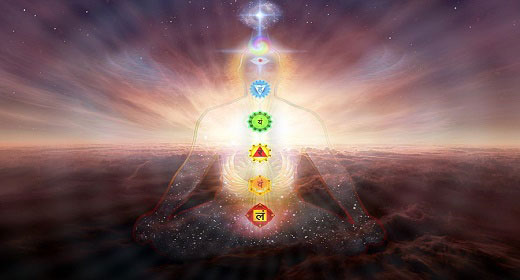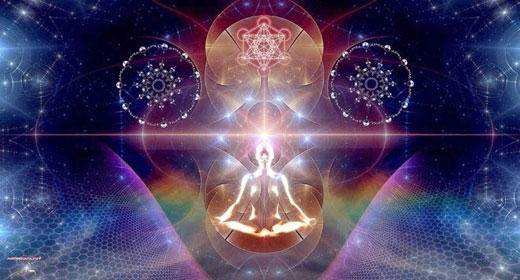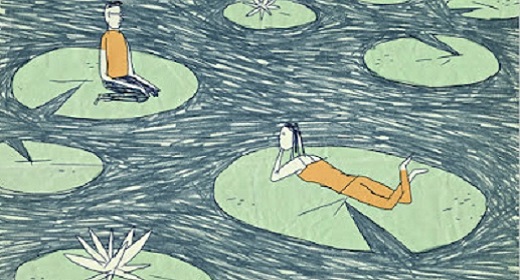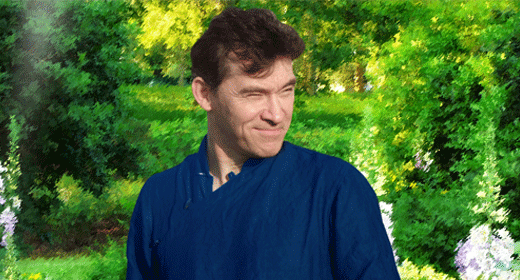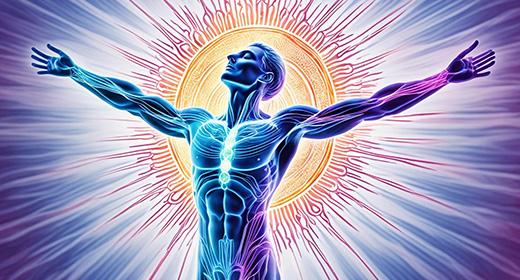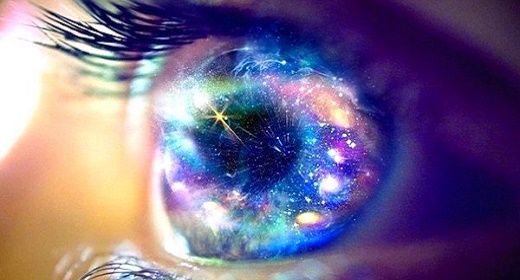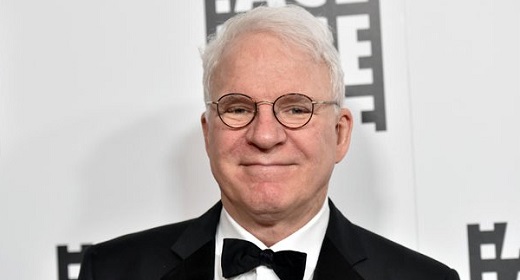Awaken: A very good day to you, Mr. Einstein… we are so appreciative to have this time with you and to share your ideas with Awaken.
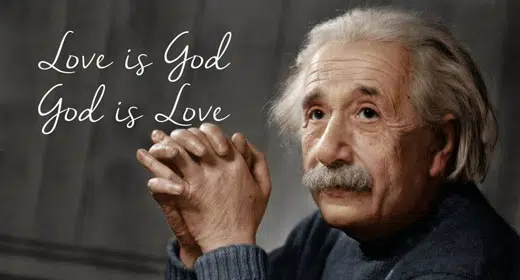
In preparing for this interview, I was most impressed by your openness to the unknown and in what may be called “faith.” Because as a scientist, many may mistakenly assume that you only trust what is known through empirical verification, rather than through belief, or the like… On this note, what do you most believe in?
Albert Einstein: I believe in intuition and inspiration… At times I feel certain I am right while not knowing the reason. When the eclipse of 1919 confirmed my intuition, I was not in the least surprised. In fact, I would have been astonished had it turned out otherwise. Imagination is more important than knowledge for knowledge is limited, whereas imagination embraces the entire world, stimulating progress, giving birth to evolution. It is, strictly speaking, a real factor in scientific research.
Awaken: It seems that you integrate, quite easily and naturally, your scientific leanings with what may be seen as spiritual inclinations…
Albert Einstein: The basis of all scientific work is the conviction that the world is an ordered and comprehensive entity, which is a religious sentiment. My religious feeling is a humble amazement at the order revealed in the small patch of reality to which our feeble intelligence is equal.
Awaken: This language of a “comprehensive entity,” reminds me of the mutual dependence that Buddha speaks of… and yet, on the ordinary, everyday plane of existence, we don’t see it…
Albert Einstein: How strange is the lot of us mortals! Each of us is here for a brief sojourn; for what purpose he knows not, so he sometimes thinks he senses it. But without deeper reflection one knows from daily life that one exists for other people – first of all for those upon whose smiles and well-being our own happiness is wholly dependent, and then for the many, unknown to us, to his destinies we are bound by the ties of sympathy.
Awaken: Strange indeed…We are so identified with the notion of individualism, even to the point of solipsism…
Albert Einstein: When we survey our lives and endeavors, we soon observe that almost the whole of our actions and desires is bound up with the existence of other human beings. We notice that our whole nature resembles that of the social animals. We eat food that others have produced, wear clothes that others have made, live in houses that others have built. The greater part of our knowledge and beliefs has been communicated to us by other people through the medium of a language which others have created… The individual has not so much in virtue of his individuality, but rather as a member of a great human community, which directs his material and spiritual existence from the cradle to the grave.
Awaken: This realization of interconnectedness makes all the everyday discriminations that we impose toward each other seem absurd…
Albert Einstein: A hundred times every day I remind myself that my inner and outer life are based on the labors of other men, living and dead, and that I must exert myself in order to give in the same measure as I have received and am still receiving… I regard class distinctions as unjustified and, in the last resort, based on force. I also believe that a simple and unassuming life is good for everybody, physically and mentally.
Awaken: I love that you mentioned this last bit, about living a simple life, as I have been leaning more and more toward simplicity as of late, especially as I age. Also, the pandemic has put many things into perspective about what is really important in life. Everything seems to now be stripped down to essentials… perhaps the most basic of all essentials is freedom?
Albert Einstein: I do not believe in human freedom in the philosophical sense. Everybody acts not only under external compulsion but also in accordance with inner necessity. Schoppenhauer‘s saying, “a man can do what he wants, but not want what he wants,“ has been a very real inspiration to me since my youth; it has been a continual consolation in the face of life‘s hardships, my own and others,’ and an unfailing wellspring of tolerance. This realization mercifully mitigates the easily paralyzing sense of responsibility and prevents us from taking ourselves and other people all too seriously; it is conducive to a view of life which, in particular, gives humor it’s due.
Awaken: Ahh… so you deny the existence of genuine freewill!… which is to say, you believe that everything we do is the inevitable consequence of prior causes, from biological to environmental, even though those causes are infinite and largely unknown to us. But… even if true—and I say “if,” since this question of freewill has not been solved in nearly 3000 years of formalized philosophical inquiry!—doesn’t this position make life feel meaningless?
Albert Einstein: To inquire after the meaning or object of one’s own existence or that of all creatures has always seemed to me absurd from an objective point of view. And yet everybody has certain ideals which determine the direction of his endeavors and his judgments. In this sense I have never looked upon ease and happiness as ends in themselves — this ethical basis I call the ideal of a pigsty.
Awaken: So then, which goals or values have guided you on your path though life?
Albert Einstein: The ideals which have lighted my way, and time after time have given me new courage to face life cheerfully, have been Kindness, Beauty, and Truth. Without the sense of kinship with men of like mind, without the occupation with the objective world, the eternally unattainable in the field of art and scientific endeavors, life would have seemed to me empty. The trite objects of human efforts — possessions, outward success, luxury — have always seemed to me contemptible.
Awaken: What do you mean when you speak of being “without kinship” with others?
Albert Einstein: My passionate sense of social justice and social responsibility has always contrasted oddly with my pronounced lack of need for direct contact with other human beings and human communities. I am truly a “loan traveler“ and I’ve never belonged to my country, my home, my friends, or even my immediate family, with my whole heart; in the face of all these ties, I have never lost a sense of distance and a need for solitude — feelings which increase with the years.
One becomes sharply aware, but without regret, of the limits of mutual understanding and consonance with other people. No doubt, such a person loses some of his innocence; on the other hand, he is largely independent of the opinions, habits, and judgments of his fellows and avoids the temptation to build his inner equilibrium upon such insecure foundations.
Awaken: What do you feel is the most appropriate political platform for the realization of these virtues, like social equality?
Albert Einstein: My political ideal is democracy. Let every man be respected as an individual and no man idolized. It is an irony of fate that I myself have been the recipient of excessive admiration and reverence from my fellow beings, through no fault, and no merit, of my own. The cause of this may well be the desire, unattainable for many, to understand the few ideas to which I have with my feeble powers attained through ceaseless struggle.
Awaken: However, we need competent leadership that is dedicated to these ends?
Albert Einstein: I am quite aware that it is necessary for the achievement of the objective of an organization that one man should do the thinking and directing and generally bear the responsibility. But the lead must not be coerced, they must be able to choose their leader. An autocratic system of coercion, in my opinion, soon degenerates. For force always attracts men of low morality, and I believe it to be an invariable rule that tyrants of genius are succeeded by scoundrels.
Awaken: And yet, in many places that call themselves democracies, it seems that… either democracy does not go hand in hand with access to essentials, such as health care, or that democracy as an ideal, does not include such indispensables…
Albert Einstein: What I value in the German political system is the more extensive provision that it makes for the individual, in case of illness or need. The really valuable thing in the pageant of human life seems to me not the political state, but the creative, sentient individual, the personality; it alone creates the noble and the sublime, while the herd, as such, remains dull in thought and dull in feeling.
Awaken: Can you make clear what you mean when you refer to “the herd?”
Albert Einstein: … the worst outcrop of “herd life,” is the military system, which I abhor. That man can take pleasure in marching in fours to the strains of a band is enough to make me despise him. He has only been given his big brain by mistake… This plague of civilization ought to be abolished with all possible speed. Heroism on command, senseless violence, and all the loathsome nonsense that goes by the name of patriotism – how passionately I hate them! How vile and despicable seems war to me! I would rather be hacked in pieces than take part in such an abominable business. My opinion of the human race is high enough that I believe this bogey would have disappeared long ago, had the sound sense of the peoples not been systematically corrupted by commercial and political interests acting through the schools and the press.
Awaken: If this aspect of herd mentality stands as the ugliest example of humanity, then what stands as the most exalted and beautiful?
Albert Einstein: The most beautiful experience we can have is the mysterious. It is the fundamental emotion which stands at the cradle of true art and true science. Whoever does not know it and can no longer wonder, no longer marvel, is as good as dead, and his eyes are doomed. It was the experience of mystery—even if mixed with fear—that engendered religion.
A knowledge of the existence of something we cannot penetrate, our perceptions of the profoundest reason and the most radiant beauty, which only in their most primitive forms are accessible to our minds—it is this knowledge and this emotion that constitute true religiosity; in this sense, and in this alone, I am a deeply religious man.
I cannot conceive of a God who rewards and punishes his creatures, or has a will of the kind that we experience in ourselves… I am satisfied with and with the awareness and a glimpse of the marvelous structure of the existing world, together with the devoted striving to comprehend a portion, be it ever so tiny, of the reason that manifests itself in nature.
Awaken: Earlier, you quipped that to inquire after the meaning of life is absurd… but would it be fair to say, based on these thoughts, that to have an experience of the mysterious is as close to realizing our purpose and to assigning meaning to our existence, as we can get?
Albert Einstein: What is the meaning of human life, or for that matter, of the life of any creature? To know an answer to this question means to be religious. You ask: does it make any sense, then, to pose this question? I answer: the man who regards his own life and that of his fellow creatures as meaningless is not merely unhappy but hardly fit for life.
To be sure, it is not the fruits of scientific research that elevate a man and enrich his nature, but the urge to understand…
Awaken: Let me ponder this a moment… Because you are, after all, a scientist. And I think many people who do not know your work deeply, may be surprised by your spiritual inclinations. What do you make of the general tendency to create a rift between science and religion?
Albert Einstein: From the study of history, one is inclined to regard religion and science as irreconcilable antagonists, and for a reason that is very easily seen. For anyone who is provided with the sense of causal law in all that happens, who accepts in real earnest the assumption of causality, the idea of a Being who interferes with the sequence of events in the world is absolutely impossible. Neither the religion of fear nor the social-moral religion can have any hold on him. A God who rewards and punishes is, for him, unthinkable, because man acts in accordance with an inner and outer necessity…
Awaken: So, if I understand you correctly, you are saying that a person of science cannot even grapple with the notion of a God because that would seem to interfere with the cause-and-effect underpinnings of nature? Yet, these two paths are not in fact irreconcilable?
Albert Einstein: In every naturalist there must be a kind of religious feeling; for he cannot imagine that the connections into which he sees have been thought of by him for the first time.
Awaken: Let me take this a bit further, and flip it around… What about those on the religious side, who would accuse the scientists of lacking in things like moral structure?
Albert Einstein: Science… has been accused of undermining morals—but wrongly. The ethical behavior of men is better based on sympathy, education, and social relationships, and requires no support from religion. Man’s plight would, indeed, be sad if he had to be kept in order through fear of punishment and hope of rewards after death.
Awaken: And… so, given that morality is quite independent from religion, what then brings one to religion?
Albert Einstein: What are the feelings and the needs which have brought mankind to religious thought and to faith, in the widest sense? A moment’s consideration shows that the most varied emotions stand at the cradle of religious thought and experience. In primitive peoples it is, first of all, fear that awakens religious ideas — fear of hunger, of wild animals, of illness, and of death.
Awaken: Does that mean that the very idea is constructed? And if so, what do you think of the notion of “God” as it is most commonly conceived of?
Albert Einstein: Since the understanding of causal connections is usually limited on this level of existence, the human soul forges a being, more or less like itself, on whose will and activities depend the experiences which it fears. One hopes to win the favor of this being by deeds and sacrifices, which, according to the tradition of the race, are supposed to appease the being or to make him well disposed to men. I call this the religion of fear.
Awaken: You have also spoken of another tier of religion…
Albert Einstein: A second source of religious development is found in the social feelings. Fathers and mothers, as well as leaders of great human communities, are fallible and mortal. The longing for guidance, for love and succor, provides the stimulus for the growth of a social or moral conception of God. This is the God of Providence, who protects, decides, rewards, and punishes. This is the God who, according to man’s widening horizon, loves and provides for the life of the race, or of mankind, or who even loves life itself. He is the comforter in unhappiness and in unsatisfied longing, the protector of the souls of the dead. This is the social or moral idea of God.
Awaken: Can you give an example of where this particular model of religion has been established?
Albert Einstein: It is easy to follow in the sacred writings of the Jewish people the development of the religion of fear into the moral religion, which is carried further in the New Testament. The religions of all the civilized peoples, especially those of the orient, are principally moral religions.
An important advance in the life of the people is the transformation of the religion of fear into the moral religion. But one must avoid the prejudice that regards the religions of primitive peoples as pure fear religions and those of the civilized races as pure moral religions. All are mixed forms, though the moral element predominates in the higher levels of social life. Common to all these types is the anthropomorphic character of the idea of God.
Only exceptionally gifted individuals or especially noble communities rise essentially above this level…
Awaken: Are you saying then, that in addition to the religion of fear and the moral religion, there is a third tier above these two?
Albert Einstein: There is found a third level of religious experience, even if it is seldom found in a pure form. I will call it the cosmic religious sense. This is hard to make clear to those who do not experience it, since it does not involve an anthropomorphic idea of God; the individual feels the vanity of human desires and aims, and the nobility and marvelous order which are revealed in nature and in the world of thought. He feels the individual destiny as an imprisonment and seeks to experience the totality of existence as a unity full of significance.
Awaken: It sounds like you are again speaking about an experience of connection, similar to the ideas embraced in eastern teachings, like Buddhism…
Albert Einstein: The cosmic element is much stronger in Buddhism, as in particular, Schopenhauer’s magnificent essays have shown us. Indications of this cosmic religious sense can be found even on earlier levels of development — for example, in the psalms of David and in the Prophets.
Awaken: And to be clear, this highest level of religion, cosmic religion, does not conceive of an anthropomorphic God?
Albert Einstein: The religious geniuses of all times have been distinguished by this cosmic religious sense, which recognizes neither dogmas nor God made in man’s image.
Awaken: Religion and politics… the forbidden subjects! We’ve spoken of religion… let’s now continue to break the rules and talk about politics! It is known that you support pacifism, but only insofar as it is carried out in a strategic way. What are the conditions in which pacifistic efforts work best?
Albert Einstein: One of the problems of pacifism is, that when pacifists come together, they usually have the feeling that they are consorting with the sheep while the wolves are outside. Thus they reach only their own kind who are already convinced, and do not advance very far. That is the weakness of the pacifist movement.
Awaken: So, all the marching and movements…it’s a bit like “preaching to the converted?” What then, is the best approach? Especially when we are facing so much division and strife in the world?
Albert Einstein: The real pacifists, those who are not up in the clouds, but who think and count realities, must give up idle words, and fearlessly try to accomplish something of definite value to their cause. We all know that when a war comes, every man accepts the duty to commit a crime—the crime of killing—each man for his own country.
Awaken: But is there ever any rightful cause for organized action against injustice? How about war for a just cause?
Albert Einstein: Now those who realize the immorality of war should do their utmost to disentangle themselves from this old idea of military duty—and so become liberated from slavery. And for this liberation I have two suggestions: the first has, during war times, been tried and practiced in the past, by those who, at great personal sacrifice, have refused to do service.
However, the sincere pacifists today, who mean to accomplish something, must take the stand in times of peace, and in those countries where military service is compulsory, the effect will be great.
On the other hand, in other countries where military service is not compulsory, these same pacifists should openly assert that in case of war, they themselves, would not participate. I recommend the recruiting of people with this idea in all parts of the world. And to the timid ones who fear imprisonment by their governments, I say: “you need not fear imprisonment, for if you get only two percent of the population of the world to declare in times of peace, ‘we are not going to fight; we need other methods to settle international disputes,’ this two percent will be sufficient—for there are not jails enough in the world to hold them!”
Awaken: So, you are saying that a resolute and explicit declaration of refusal to participate in war would have a tremendous impact, if only we would stick with it and do so fearlessly? And what is the other suggestion?
Albert Einstein: The second method which I suggest appears less illegal. I believe that international legislation should be advocated to the effect that those who declare themselves as war resistors should be allowed during peace times to take up different kinds of strenuous or even dangerous work, either for their own countries or for the international benefit of mankind.
This would prove that they do not oppose war for their own private comfort or because they are cowards or because they do not want to serve their own country or humanity… I further suggest that war resistors should organize themselves internationally and collect funds to support those resistors in the different countries who today cannot make progress because of lack of financial backing.
Awaken: Thus, making the point that it’s not laziness, fear of discomfort or danger, that we are afraid of, but are rather, taking a stand against the immorality of war itself… This model of what it means to be valuable is so different than the simplistic one, based on an antiquated notion of “service to one’s country”…
Albert Einstein: A man’s value to the community depends primarily on how far his feelings, thoughts, and actions are directed toward promoting the good of his fellows. We call him good or bad according to his attitude in this respect. It looks at first sight as if our estimate of a man depends entirely on his social qualities. And yet, such an attitude would be wrong. It can easily be seen that all the valuable achievements, material, spiritual, and moral, which we receive from society have been brought about in the course of countless generations by creative individuals. Someone once discovered the use of fire, someone the cultivation of edible plants, and someone the steam engine.
Awaken: On a different note… pun surely intended!… I share your well-known love of music. How is that love related to the work you do as a researcher?
Albert Einstein: Music and physical research work originate in different sources, but they are related through their common name, which is the desire to express the unknown. Their reactions are different, but their results are supplementary. As to artistic and scientific creation, I hold with Schopenhauer that their strongest motive is the desire to leave behind the monotony of every day life, so as to take refuge in a world crowded with the images of our own creation.
This world may consist of musical notes as well as of mathematical rules. We try to compose a comprehensive picture of the world in which we are at home and which gives us a stability that cannot be found in our external life.
Awaken: What a beautiful place to leave our fruitful and delightful conversation. It has been a pleasure! On behalf of Awaken, I thank you so very much for your time today!
This is one of Awaken’s Dream Interviews, conducted by Donna Quesada, and All Answers are Verbatim from Albert Einstein.

